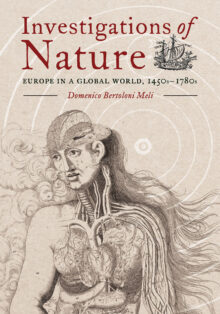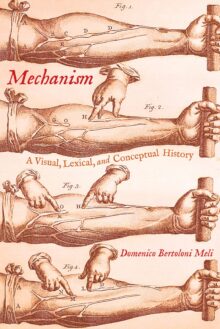
Domenico Bertoloni Meli
Domenico Bertoloni Meli is provost professor in history and philosophy of science and medicine at Indiana University, Bloomington. He has received several fellowships and awards, including a Wellcome Fellowship at Cambridge University, a Dibner Fellowship at the Massachusetts Institute of Technology, a membership at the Institute for Advanced Study, Princeton University, and a John Simon Guggenheim Fellowship.
Investigations of Nature
Europe in a Global World, 1450s-1780s
Investigations of Nature takes us on a guided tour through history, when voyages of exploration and exploitation were tied to technological advances in navigation and warfare; religious unity was broken with huge political, economic, and intellectual consequences; and the new art of printing led to an explosion of information. After a brief introduction, each part of this book—from sections on the Renaissance to the Epistemic Revolution to the Enlightenment—opens with a chapter discussing a defining characteristic: geography and navigation characterize the Renaissance as the age of discovery and colonialism; astronomy and optics characterize the Epistemic Revolution as the age of new instruments, such as the telescope; and universal gravity in Newton’s time characterizes the Enlightenment as the age of quantification, with welcome and unwelcome consequences and reflection on the status of our theories. Heavily illustrated and with a practical historiographic guide and bibliography for further reading, this book is an indispensable teaching tool for anyone seeking an accessible survey of the Renaissance or the Enlightenment.
Mechanism
A Visual, Lexical, and Conceptual History
The mechanical philosophy first emerged as a leading player on the intellectual scene in the early modern period—seeking to explain all natural phenomena through the physics of matter and motion—and the term mechanism was coined. Over time, natural phenomena came to be understood through machine analogies and explanations and the very word mechanism, a suggestive and ambiguous expression, took on a host of different meanings. Emphasizing the important role of key ancient and early modern protagonists, from Galen to Robert Boyle, this book offers a historical investigation of the term mechanism from the late Renaissance to the end of the seventeenth century, at a time when it was used rather frequently in complex debates about the nature of the notion of the soul. In this rich and detailed study, Domenico Bertoloni Melifocuses on strategies for discussing the notion of mechanism in historically sensitive ways; the relation between mechanism, visual representation, and anatomy; the usage and meaning of the term in early modern times; and Marcello Malpighi and the problems of fecundation and generation, among the most challenging topics to investigate from a mechanistic standpoint.


